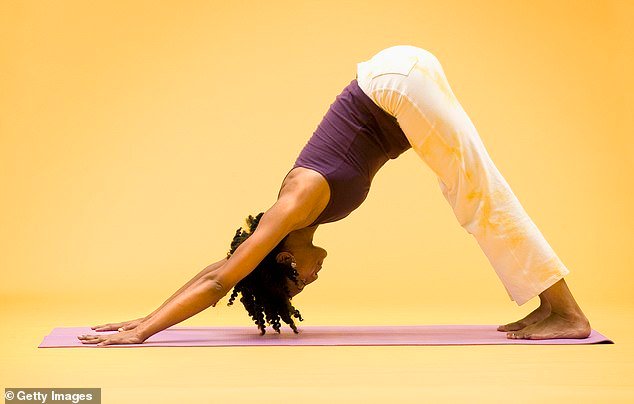Are you constantly anxious? I’m a top psychiatrist and this is how I treat my patients… and the one thing you MUST stop eating right now: DR MAX PEMBERTON

Are you constantly anxious? I’m a top psychiatrist and this is how I treat my patients… and the one thing you MUST stop eating right now: DR MAX PEMBERTON
It is normal to be anxious and worried at times. Of course it is. But for some people, these feelings aren’t temporary. Instead, they become a constant feature – a state of chronic anxiety.
While we read and hear a lot about depression these days, anxiety is actually more common, affecting about one in six adults – though often the two conditions go hand in hand.
Interestingly, while depression receives the most attention, many sufferers tell me they find their anxiety symptoms harder to deal with.
The constant sense of dread can be unimaginably debilitating. That knot in the stomach, that nagging worry, makes it hard to concentrate on anything else. It can feel relentless. I’ve even had patients describe it as a form of torture.
Humans feel normal levels of anxiety for a reason – it helps us respond when there’s a threat. Anxiety will help you remove yourself from potential attack, for example.
But in anxiety disorders, that feeling isn’t attached to a real threat. Instead, it appears when nothing’s wrong or it attaches itself to something which isn’t threatening.

While we read and hear a lot about depression these days, anxiety is actually more common, affecting about one in six adults – though often the two conditions go hand in hand
It’s as though our brains have got confused and start seeing danger in innocuous, everyday situations. Feelings of worry are conjured from nowhere. And the problem then is that anxiety spirals.
People feel anxious about feeling anxious until they’re in a vicious circle with anxiety feeding on itself. It is torment.
What can you do if you suffer from anxiety? Making some easy lifestyle changes can stop it.
Get regular exercise
I know doctors often recommend exercise, but there’s really good evidence for it helping here. Movement reduces stress hormones, which contribute to the feelings of anxiety, and increases endorphins, which help boost mood. Walking, jogging, swimming, dancing, yoga, or resistance training – it doesn’t really matter what you do, as long as you’re moving.
Aim for at least 30 minutes a day, most days. If you’ve not really exercised before, don’t worry. The good news is that even short 10–15-minute bursts of movement throughout the day add up and can help reduce anxiety levels.
Meditate, be mindful

Apps such as Headspace provide guided meditations that can help lessen anxiety
Focus on your breathing. Breathe in for three seconds, hold your breath and count to five, then breathe out again for three seconds. Continue for one minute. How do you feel?
Keep doing this until you notice your anxiety has lessened. You can also try mindful exercises where you focus on your body and progressively relax. There are some great apps such as Headspace that provide guided meditations.
Knit or build Lego
If your mind feels too cluttered or anxious to try meditation or mindfulness, you need to distract yourself.
Calling someone and having a chat about something other than anxiety often helps. Other people find ‘craftfulness’ helps – doing an activity such as knitting or building Lego where you focus your attention on something outside of yourself. Doodling, drawing or colouring books are good places to start.
Focus on your worries
This is a counter-intuitive one! But when we’re anxious we often don’t think carefully about the thing that’s making us anxious.
If you find yourself lying awake at night worrying, it’s sometimes helpful to think hard about what it is that’s causing you anxiety.
Writing a list of what’s worrying you can help clear your mind before bedtime.
Sleep well
Go to bed and wake up at the same time, even on weekends.
Quality sleep stabilises mood and reduces anxiety.
Try to create a calming, wind-down ritual, with things like reading, stretching and dimming the lights an hour before bed.
Avoid screens an hour before bedtime – they overstimulate you.
Avoid social media
For some people social media can be a useful way to connect with others. But the algorithms also mean it can serve up content designed to rile us or annoy us. It’s very easy to compare ourselves to others which can affect our mood and self-esteem. I’m not saying don’t use social media, but try removing social media apps from your phone so you have to consciously choose to log-on via a computer.
This will reduce the risk of you scrolling through large amounts of negative news or distressing online content.
Eat a balanced diet

Opt for omega-3 rich foods, rather than ultra-processed foods, which can destabilise blood glucose levels
We all love a takeaway, but there’s increasing evidence that ultra processed foods intensify anxiety levels. UPF can destabilise blood glucose levels, which can increase a sense of anxiety.
They also disrupt the community of microbes living in the gastrointestinal system – the microbiome – which has been linked to the development of anxiety disorders. Eat a varied diet with lots of fruit and vegetables to help nurture good microbes.
For two weeks eat whole foods, reduce processed sugar and caffeine and choose omega-3-rich foods like salmon and walnuts. You should feel better.
If symptoms continue…
CBT (cognitive behavioural therapy) is a talking therapy that ‘retrains’ the brain to be less anxious. You work closely with a therapist to explore your thoughts, feelings and behaviours. People usually need 10 to 15 sessions. Your GP can refer you to your local service.
Source link





